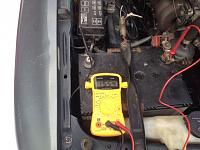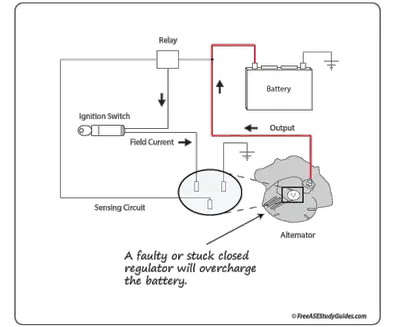
The sensor regulates the amount of electricity the alternator produces. What will cause a alternator to overcharge.

Why would an alternator overcharge.
What causes an alternator to overcharge. This surge disrupts the wiring in the alternator causing an overcharging condition. Additionally an incorrect replacement battery in the vehicle can cause an overcharging condition. This happens in newer vehicles with alternators that need signals from the vehicles electronic control unit.
Then what causes the alternator to be overcharged. Contact Point Gets Damage. If the contact point gets damage of course it will interfere with the performance of the voltage regulator.
The contact points can experience switch failure which causes the input voltage to the rotor coil to always be at full voltage 12 V. Some of the most common causes an alternator to overcharge are battery fault Voltage regulator in your car and Alternator size. Also if you jump-start your car in.
Alternator overcharging occurs when the battery condition is weak. You may face overcharging due to a failed regulator. Driving at breakneck speeds on broken roads can cause battery cells to break down one by one.
This causes the alternator wires to break. As a result the alternator becomes overcharging. Why would an alternator overcharge.
Over-charging is caused by the voltage regulator driving the alternator too hard. Theres two possibilities for this condition. The voltage regulator is shorted which is fairly uncommon or the control wire going to it is grounded.
Why does an alternator overcharge. Typically one of two problems cause overcharging alternators. Poor battery condition and failed.
However if the wrong alternator is placed in the car or if the alternator is running at the wrong pace it will create too much energy for the car battery causing it to overcharge. If a battery charger is used to charge your battery outside of your car improper use of the charger can result in overcharging. You are correct 18 volts is much too high but an alternator can not cause over-charging unless it is assembled incorrectly with one of the brushes grounded through its mounting screw.
Over-charging is caused by the voltage regulator driving the alternator too hard. Theres two possibilities for. Typically one of two problems cause overcharging alternators.
Poor battery condition and failed regulators. When a battery is already getting old and worn down the alternator may run extra hard to increase its charge. What causes an alternator to put out too much voltage.
If you are getting more than 2 volts above base voltage most likely your alternator is over-charging the battery or the battery is faulty. Other potential problems are a faulty voltage regulator or a problem in the charging system wiring. Hey Carl the alternator output is 15 volts from the post and I verified that the case ground is good 2 ohms.
After a bit of research I started looking into the wires coming from the plug on the side Sky Blue and WhiteRed. Even with the plug unplugged the alternator is still putting 155 volts. What can cause alternator to overcharge.
Improperly jump-starting the vehicle can send a surge through the battery that destroys one or more cells in the battery or shorts it out. This surge disrupts the wiring in the alternator causing an overcharging condition. The sensor regulates the amount of electricity the alternator produces.
A defective sensor causes the alternator to overcharge by sending an inaccurate signal. Alternators can also overcharge due to incorrect replacement batteries. This surge disrupts the wiring in the alternator causing an overcharging condition.
Additionally an incorrect replacement battery in the vehicle can cause an overcharging condition. This happens in newer vehicles with alternators that need signals from the vehicles electronic control unit. If one of these wires were to become damaged or worn out then it could cause the alternator to fail at its job and the battery to not get charged.
If you dont see any of the other problems on this list being present in your vehicle then check the wiring of the alternator because that may be the reason for the alternator not working. It turns the alternator rotor on and holds the voltage steady at 145146 volts until the key is turned off so the charging is always held on with no interruptions. When the voltage rate of 146 is reached excess charge voltage is dumped to ground thats why its.
While an alternator with an internal regulator could fit in perfectly problems arise if your ECU is the one that controls the alternator. The unexpected specifications will cause incompatibilities that will result in overcharging as the alternator produces more than it should or undercharging when the alternator cant keep up. Overcharging of the battery by a defective or malfunctioning alternator will result in the battery reaching an overcharged state.
When overcharged the plates inside the battery shed material and lose their capacity to hold electricity. The Absorbed Glass Mat AGM battery is fragile to the smallest overcharge. Shorted transistors or diodes in the alternatorregulator can cause all sorts of problem like very high output voltages.
The output voltage may also vary with engine speed in those conditions. The charging system as a whole appears to adjust the regulators output. What will cause a alternator to overcharge.
Improperly jump-starting the vehicle can send a surge through the battery that destroys one or more cells in the battery or shorts it out. This surge disrupts the wiring in the alternator causing an overcharging condition. A bad ground shouldnt overcharge a battery- but if you want to verify condition of alternator and put this out of the way for the test- hook a jumper cable from neg battery terminal to alternator mount or alt.
Casing and then do the voltage test. So as he is a good mechanic diagnosed it saying that the alternator is overcharging the battery causing the bubling and associated oddities. To confirm we took it to advance auto to get an alt test.
They tested it and showed 17 volts unloaded and 16 loaded. The parasitic load was at a whopping 487 Amps. In severe cases where the damage cannot be undone it is best to simply replace the battery but where possible the entire processes can be reversed by removing the cause or causes.
For example when the overcharging is caused by a faulty alternator fixing the alternator will stop the entire influence of overcharging on the battery and it.